I’ve played a lot of Diplomacy matches with players who were shocked, even mystified, as to why they were betrayed by an ally. They don’t know exactly what happened or why, and that’s actually quite understandable. In the heat of an ongoing match, it is hard to make an objective assessment of “what went wrong.” But with time and contemplation, one can start to figure these things out.
In this series of articles, I will tell you about the top 5 most common reasons you were backstabbed in your Diplomacy matches. Next time you are backstabbed and feel like you don’t understand what happened, consider which of these explanations applies to your situation. You will find it easier to learn from your mistakes if you keep this list in mind!
Reason #1: You were Annoying

Most Diplomacy players factor in a rival’s personality when evaluating that rival as a potential ally. Although each of the seven countries has inherent geographic constraints that make certain alliances more powerful or desirable, it is possible to form an alliance between any two powers or combination of powers.
Face-to-face Diplomacy matches can last more than 5 hours, and Online Diplomacy matches can last weeks or months. Diplomacy players are human beings and participate in the activity for fun; most players do not consider it “fun” to form an interpersonal relationship with someone whose personality they despise.
Most players will decide who to ally and who to attack based on their initial impressions of each rival’s intentions and personality. If you’ve acted rude, stubborn, or selfish right from the start, you may find yourself wiped off the map within the first couple of years (without even necessarily getting backstabbed by anybody). But even if the other players tolerate your bad attitude for the first couple of years (probably for strategic reasons that have nothing to do with your personality), they will eventually conspire against you.
In Diplomacy, the players must attack each other. And a surprise attack is more likely to succeed. Thus, many players, as a matter of course, send friendly messages and make alliance offers to almost all of their rivals—even rivals with an irritating personality, even (and especially!) rivals who they plan to attack.
If your press style irritates others, you will experience players going out of their way just to make your life harder. This includes backstabbing you. Many players prefer to backstab rivals that they dislike. Conversely, some players (Carebears) outright refuse to attack rivals who treat them with kindness. And players like Your Bored Brother (who relishes backstabbing friends and enemies alike!) will nevertheless deliberately target players with a bad attitude because “I attacked them because they were rude!” is a great way to obfuscate a ruthless playstyle.
Example: ODC 2019 Round 2, Game 3 (Semi-Finals) (Aug 2019—Nov 2019)
I have been competing in the 2019 Online Diplomacy Championship for most of 2019. Each round of the tournament consists of two anonymous seeded matches, and the players with the best combined score (using sum-of-squares scoring) advance to the next round. There are three rounds.
I journaled extensively about my first match. I performed well in that match as well as my other preliminary match, and so I advanced to the semi-finals as the 7th seed (out of 28). I want to tell you about how a player’s irritating personality affected their result in one of my semi-finals matches. In the match in question, I played as Italy.
Now, let’s look at Germany’s strong position at the dawn of Spring 1902:
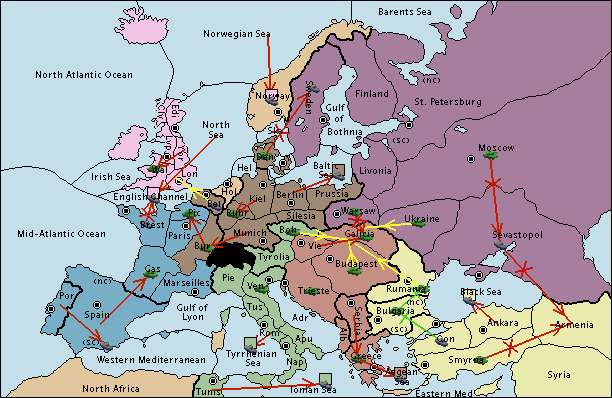
From “reading the board“, you can infer:
- Germany is allied to England against France and Russia (which I recommend for Germany).
- The German/English initial attacks have gone well. Germany has penetrated Burgundy, France’s fleet is somewhat out-of-the-way in Spain, and Russia cannot defend Sweden or retaliate against a German attack.
- Germany is poised to profit from the success of this alliance, as Germany is in position to capture Holland and Sweden, which would increase Germany’s number of supply centers to 7, putting Germany in the lead with no obvious enemy. Although unlikely, Germany could capture a French center as well (and is at least setting up to make a future capture).
But what you can’t tell from looking at this board is that England, France, and Italy (me!) disliked Germany’s personality quite a bit and discussed this with each other. (I don’t know for sure that England and France truly felt this way, but I definitely felt irritated by Germany’s playstyle and have every reason to believe England and France were being honest with me in sharing this feeling.) Guess what happened next?
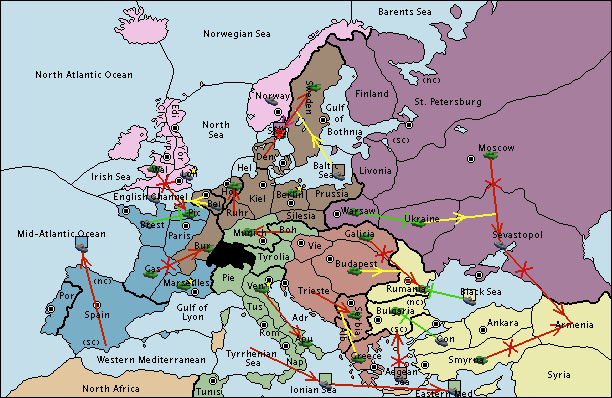
I (Italy) backstabbed Germany to (temporarily) steal Munich! Although I certainly had short-term strategic reasons for doing this (I didn’t want Germany to get a runaway lead and I wanted to maintain an army presence in the center of the board without scaring my ally Austria too much), I also considered that Germany’s bothersome attitude would give me cover for this backstab. That is to say, I wanted to present myself as a Carebear to gain my rivals’ trust. Harassing a player who “deserves it” is consistent with this persona.
Tactically speaking, my backstab only slightly and temporarily held Germany back; after all, Germany still got 1 build and I (Italy) had poor prospects of keep Munich long term. Germany still controlled the most centers of any power (six). But my harassment signaled the beginning of Germany’s decline.
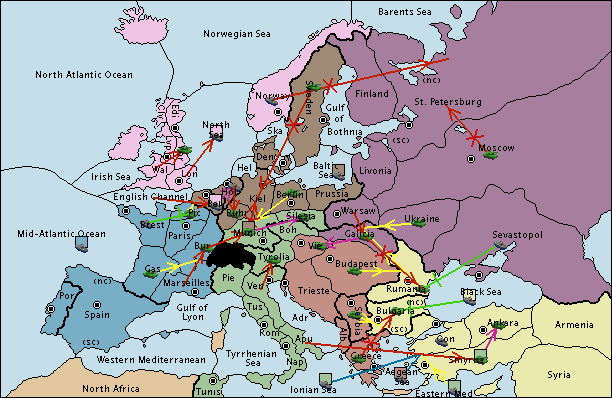
Germany had to spend a turn regaining Munich. England used the brief opportunity to change sides! Germany was thus backstabbed by two players on back-to-back turns.
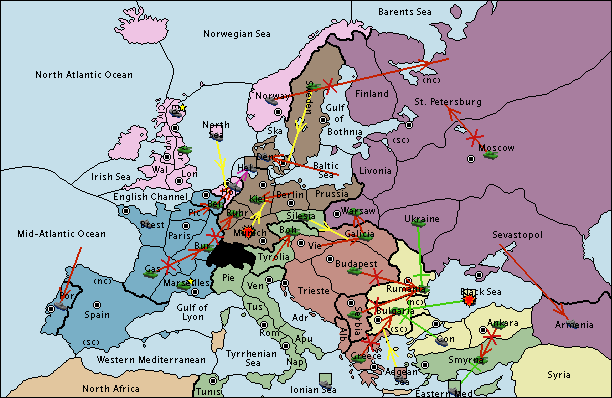
At the end of 1903, Germany had retaken Munich from me (Italy), but lost Belgium to France and Holland to England.
As a general rule, it is not a good idea to backstab a player to only gain a single supply center. But I (Italy) and England were both willing to make an exception. As this match took place in the semi-finals of a serious tournament (that is to say, after many players had already been eliminated from a large pool), I do not think my and England’s violations of this heuristic can be attributed to naïveté. Although there are strategic reasons for why we played the way we did, Germany’s frustrating attitude played a major role in why we attacked Germany.
By the way, I backstabbed Germany again in 1904, dealing a crushing blow from which Germany never recovered.
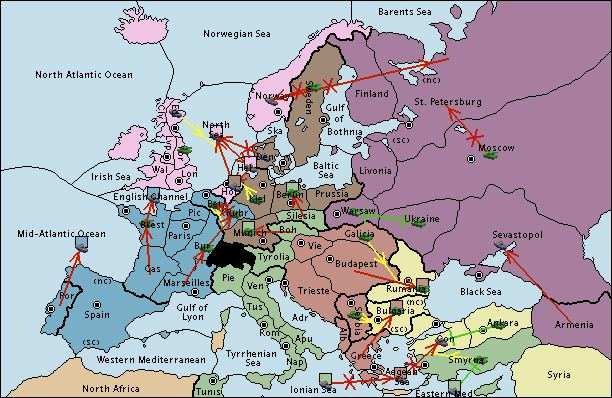
I ended the match with all of Germany’s home centers (which is very rare for Italy) and a respectable 35/100 points (the points were calculated according to Sum-of-Squares scoring).
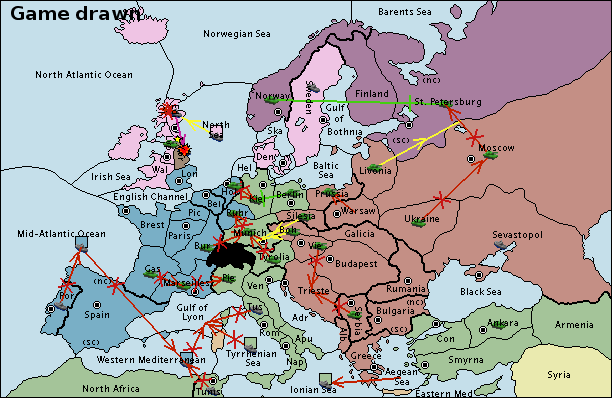
The draw votes were in, with this board, on Spring 1908.
In passing, let me tell you that I performed well in both my semi-finals matches. As of this writing, 3 of the 8 semifinals matches have finished, and I was in two of the finished matches. My combined score is sufficient for me to advance to the finals, regardless of the outcome of the other 5 matches. I will write more about my tournament success, what I did to succeed, and my results in the finals (whatever they may be). If you can’t wait to find out more, please subscribe to this blog!
Solution: Charm Your Rivals
Charm your rivals with your press. Send messages that are thoughtful, attentive, courteous, and friendly. All else being equal, players will choose you as an ally over someone who acts lazy, selfish, or rude.
To charm someone, you must focus on their needs. You must focus on their desires. You must act friendly according to how they understand friendliness. The Golden Rule of Press Diplomacy is “Treat others they way they want to be treated.” One technique for accomplishing this is “mirroring,” whereby you mimic the press style of your rival (you try to match their tone, word choice, frequency and length of messages, balance of tactical-vs.-social content, and so on).
Put in the effort to get to know someone—not only in terms of their Diplomacy strategy but also on a human level. This won’t make you immune to backstabs (there are other reasons you get backstabbed, and we’ll get to those!), but it will stop players from backstabbing you out of sheer contempt.
And sometimes you can be so charming that your ally will refuse to betray you. Let’s look a second time at the final board, but this time juxtaposed with some post-game commentary:

Good game all. I am impressed that Austria didn’t try for a solo
-The Russian
Truth is, Italy was a bomb proof ally, so I never considered it.
-The Austrian
Even though I and my ally Austria were competing in a serious tournament, and even though the match was anonymous, we developed such an intimate relationship that I am uncomfortable sharing the details on my blog. But for example, the Austrian player gave me thoughtful career advice. I hope to invite them to play Diplomacy with my family in the future.
How to Not be Annoying
Here’s a list of annoying attitudes I’ve encountered (or, let’s be honest here, embodied) many times during my career as a Diplomacy player, as well as my advice on how to avoid acting in these ways:
- Selfishness. There are players who use their press entirely to persuade their rivals to do them favors. This may work here and there (such as with inexperienced players, or at the start of a match), but most of the time these efforts are laughably transparent and fairly annoying. Your rivals have their own goals, and will be much more willing to be your long-term ally if you—in turn—are willing to do some actions that benefit them too. Repeatedly granting favors to an ally goes a long way in building rapport.
- Demands. If you express your wishes in the form of demands (“Do X if you want to be my ally!” or “Do X, or else I will do Y!”), you will grate others’ egos. Most Diplomacy players are willing to negotiate, and you might be surprised about what players will agree to if you just ask nicely. Construct and describe your wishes as offers, e.g., “If you are willing to do X, I am willing to do Y in return.” You can ask for almost literally anything (I directly ask players to throw me the win sometimes!) without offending another player as long as you are respectful and undemanding.
- Threats. There are players who issue threats constantly, even from the very start of the match. Although a wise Diplomacy player is paranoid, expressing your paranoia in the form of threats is not wise. Most players understand that you will fight back if they attack or betray you; pointing that out is uncouth. Further, it’s silly to make threats you seem unable or unwilling to keep. Do not issue threats unless you believe you are in serious danger, and that the other player might not actually understand what you are capable of doing in retaliation. I play plenty of matches were I never issue a threat. If you are making threats more than once or twice in a game, you are probably over-using this ploy.
- Ultimatums. An ultimatum is combination a demand/threat where a player says “You must do X, or I will attack you/throw the match/never speak to you again/etc.” There are times when messages like this are beneficial (clear communication is important) or even necessary. But if you speak to other players in this manner over small problems or things that are not really your business, you will quickly alienate your rivals. You should refrain from issuing ultimatums during the first few years of the match, e.g., if you are Russia you should not threaten to all-out attack Germany if Germany doesn’t give you Sweden.
- Frequent/Unnecessary Lying. If you lie too often, or lie over little things, or lie for no discernible reason, your rivals will dislike you—even if you’re doing everything else right to put on the charm. This dislike and mistrust will build up, and eventually constrain what you can get away with because you have few friends (if any). Lying is an important part of Diplomacy, but it isn’t every part of Diplomacy. When you lie, you should lie big and try to get away with something serious, interesting, and powerful (like a devastating backstab); most players, even the victim, will have a grudging respect for this kind of lying.
- Accusations. If you think another player is out to get you, has lied to you, is undermining your plans, etc.—they probably are. Welcome to Diplomacy. Most of the time, it is better to play along and play nice with other players, even though they are duplicitous. Accusations tend to be self-destructive. If you accuse players early and often, they may deem you to be annoying to talk to even if your accusations are accurate. And if your accusations are not accurate, then you’ve alienated players for nothing. If you finding yourself thinking you should “call out” or otherwise accuse someone of something, think again. Ask yourself: what is there to gain—strategically—from this accusation? (The likely answer: nothing.)
- Direct Criticism and Blame. Directly criticizing a player’s press, tactics, or strategy in your messages to that player is playing with fire. Most people are proud, defensive, and egotistical; Diplomacy players can be even worse than your average person in this regard. Unless you have a clear diplomatic reason for antagonizing a player (e.g., you are trying to manipulate a player by toying with their vanity or anxiety), avoid direct criticism and blame. Your constructive criticism can wait until the match is over; do not let your emotions get the better of you.
- Indirect criticism can be effective in putting a 3rd party in your camp. That is to say, you might criticize one player to a different player to find common cause with that 3rd player. Important: it doesn’t matter if the criticism is true; the point isn’t to vent your frustrations, but to build rapport. You could even cloak the sincerity of your alliance by issuing a torrent of (false) criticism of that ally to a 3rd party.
- Infrequent Press. If you respond infrequently to every player’s messages, they may become frustrated with how difficult it is to negotiate and plan with you. Make sure to stay responsive.
- Overwhelming Press. If you send a lot of press to a player who doesn’t expect or want that amount or frequency of messaging, they will be annoyed. You can directly ask them how much press they would like to get from you at the start of the match. Some players will say “Bring it on! The more the better!” in which case—go nuts.
- Message Forwarding. Generally speaking, it is bad form to forward messages that were sent to you privately. Although it is important to discuss what each player is saying to you, the polite way to do this is to describe the messages instead of forwarding them. Players generally do not want you to forward their messages, so even receiving a forwarded message can be alarming; the recipient becomes worried that you are an open book who can’t be trusted to conspire discreetly (a core part of Diplomacy play).
This is not an exhaustive list. There is a limitless number of annoying, rude, or irritating things you can do and say to players during a Diplomacy match.
There’s more to come!
So you’ve decided to adopt my advice: be a charming Diplomat. But you know there’s more to avoiding backstabs than that! After all, Your Bored Brother himself seems to relish a backstab on even the friendliest of allies…
There will be 5 entries in this series, each describing another one of the top 5 reasons players get backstabbed in Diplomacy—as well as how to avoid and overcome those problems in your own games!
I cannot agree with that last point enough.
I was introduced to Diplomacy back at school in my mid-teens, playing it by email or over online judges. As someone brought up to tell the truth, the idea that you were *supposed* to deceive others in this game was intoxicating to a teenaged boy.
I went a little mad – of course forwarding a message could be damaging, I thought, but why not alter it before forwarding, or even fabricate messages entirely? (I have since read the story about Edi Birsan doing the same in postal play, so clearly this thought was not unique!)
I soon found that this did not have the effect I was aiming for – instead, people took against me for forwarding the message (even if it was genuinely warning them of an attack), and it didn’t take too many games for me to learn that this was a terrible strategy. After all, if someone will share another’s message with you – or, worse, a doctored or faked message – they will do the same with yours to someone else.
I haven’t forwarded a message since, and have seen my scores improve significantly.